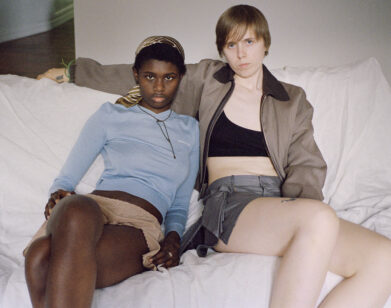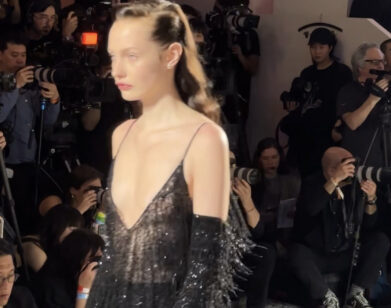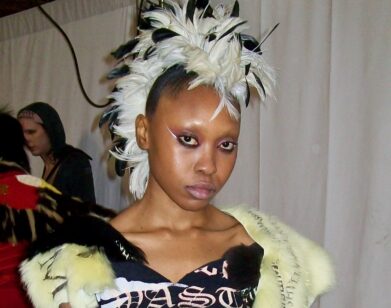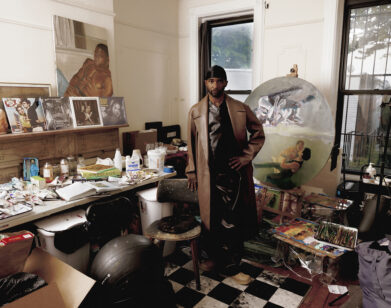New York glam trio Sunflower Bean isn’t just another fashion band
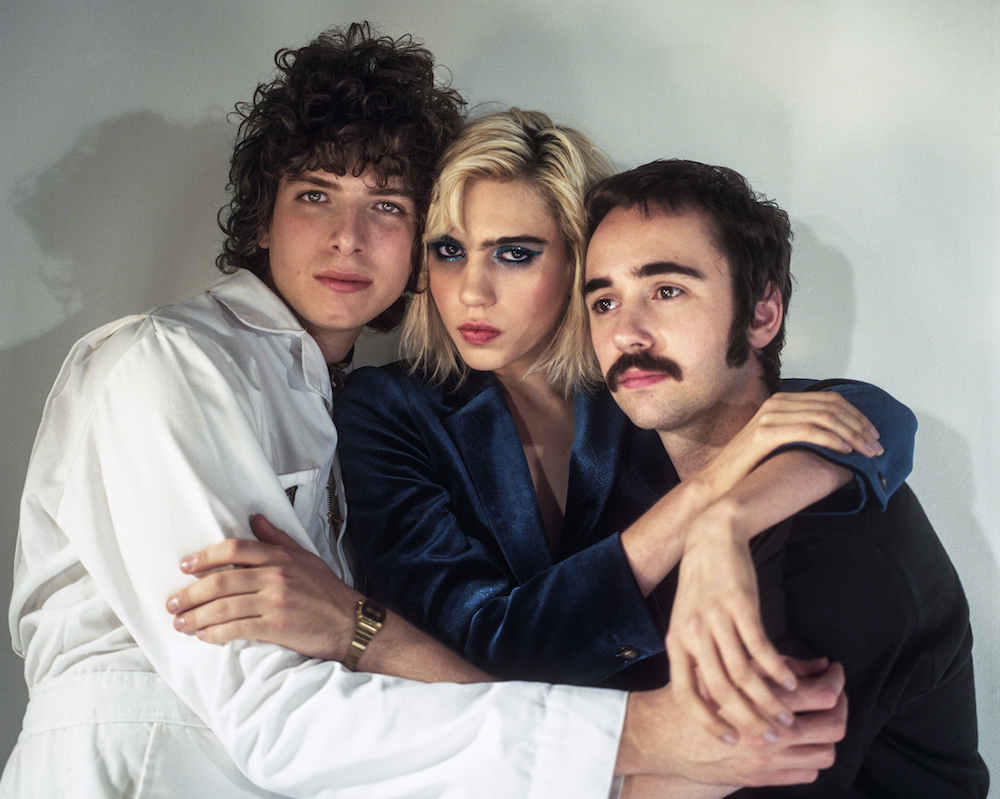
When New York City rock outfit Sunflower Bean first hit the scene in 2013, a torrent of buzz swirled around the band of then-teenagers. At 17, lead singer and bassist Julia Cumming had already begun posing for Hedi Slimane and walking the runways for Anna Sui and Saint Laurent, leading some people to wonder whether she was a model first and a musician second. Having now released two albums—their latest, Twentytwo in Blue dropped late last month—her artistic bonafides are no longer in question. Cumming, along with singer and guitarist Nick Kivlen, and drummer Jacob Faber, crafts subversively sweet power pop anthems that refuse to be boxed in.
“When I think of Sunflower Bean, there’s really only two things that define us,” says Cumming. “First, we make guitar music. And second, we always reject the norm.”
For the 22-year-old, that often means alternating between an androgynous uniform of black leather jackets and unapologetically feminine old Hollywood looks. When it comes to the band’s sound, it means constantly reinventing themselves. On Twentytwo in Blue, Sunflower Bean abandons the scuzzy shoegaze vibe of their first releases in favor of a more polished glam rock take on the current political climate. With tracks like “Twentytwo” and “Crisis Fest,” the trio highlights the uncertainty they felt following the presidential election. “Not that it’s a political record exactly,” notes Cumming, “but the circumstances have definitely influenced our music.” It’s a sophisticated approach, especially for a band that many dismissed as superficial because of their fashionable ties. But as Cumming sings in the shimmering “Human For,” “I’m not going to say sorry.”
“If people want to think we’re shoegaze, or if people want to think we’re just some fashion band,” she concludes, “to that we say, ‘I don’t care.’ At the end of the day, we know what we’ve done to get where we are. Nothing else matters.”
ALEXANDRA WEISS: Tell me about the new record. What inspired it?
JULIA CUMMING: We started working on this record after we finished touring our last record, which was in November of last year. So, it’s been basically over a year of working on it non-stop. We just wanted to go deeper into ourselves and look inward to figure out what we wanted from our songs and as songwriters. We knew how to be outward but we didn’t know how to reflect on ourselves and put it in our work.
JACOB FABER: We wanted to use everything we had learned and how much we had grown on the road and take all of that experience and put it into this new record and focus on the songwriting aspect of it, just letting these songs evolve and grow into what they need to be.
WEISS: How would you compare it to your last album?
NICK KIVLEN: The biggest difference is that we wrote and recorded it during a specific time frame. Our first record was just a collection of songs we had written over the course of our first couple years as a band. So, this was our first time sitting down and writing an actual record.
FABER: Yeah. That’s a huge difference because for this record, it’s almost like we created this own little world for these songs to live in.
CUMMING: Thematically, also, there’s a lot running through it. We were inspired by the current environment, and everything happening in the United States. So, it’s a lot about our experience and everything we’ve been going through since the election. I mean, we’ve been on tour basically non-stop, and we spent a lot of time talking to our fans, and to each other, about the election and all of the things that have transpired since then. I think a lot of what we’re saying on the record are things we wish we would’ve said to them, and in a lot of ways, to ourselves, because we’re all in this together.
WEISS: What was it specifically about the election, and about the current political climate, that you’ve been responding to?
KIVLEN: The most immediate factor, and probably the most pressing thing on our minds when were trying to get into the headspace to write this album was the fact that we spent pretty much all of September, October and November leading up to the election traveling around the entire country. So, we were witnessing all of the divisiveness and volatility, and how much the election was weighing on everyone. We met so many people our age and younger who were just genuinely concerned and afraid of the future, and what America was going to become. It was such an uncertain time with this huge, looming threat of backwards and ignorant thinking being perpetuated by the potential president. So, that was weighing heavy on us when we went in to start writing songs.
FABER: The way I’d describe the feeling was just heavy. That tour opened our eyes. In New York, you know, it’s easy to get stuck in this little liberal bubble with all of your friends, but even 70 miles away in Pennsylvania, things are different. That was eye-opening and just made the whole thing feel really real.
CUMMING: Right. And I think the thing with music—and all art—is that it’s the way we get by and process things. So, it’s all over the album, but especially in a song like “Crisis Fest,” where the feelings just came to a head. When we were writing, we were trying to approach the subject in all of these different, maybe less obvious ways, but we finally decided to just go for it, and tackle it head on.
KIVLEN: “Crisis Fest” is absolutely the most overtly political song on the album. But I think there’s also a lot of subtext there that was shaped by what we’re going through.
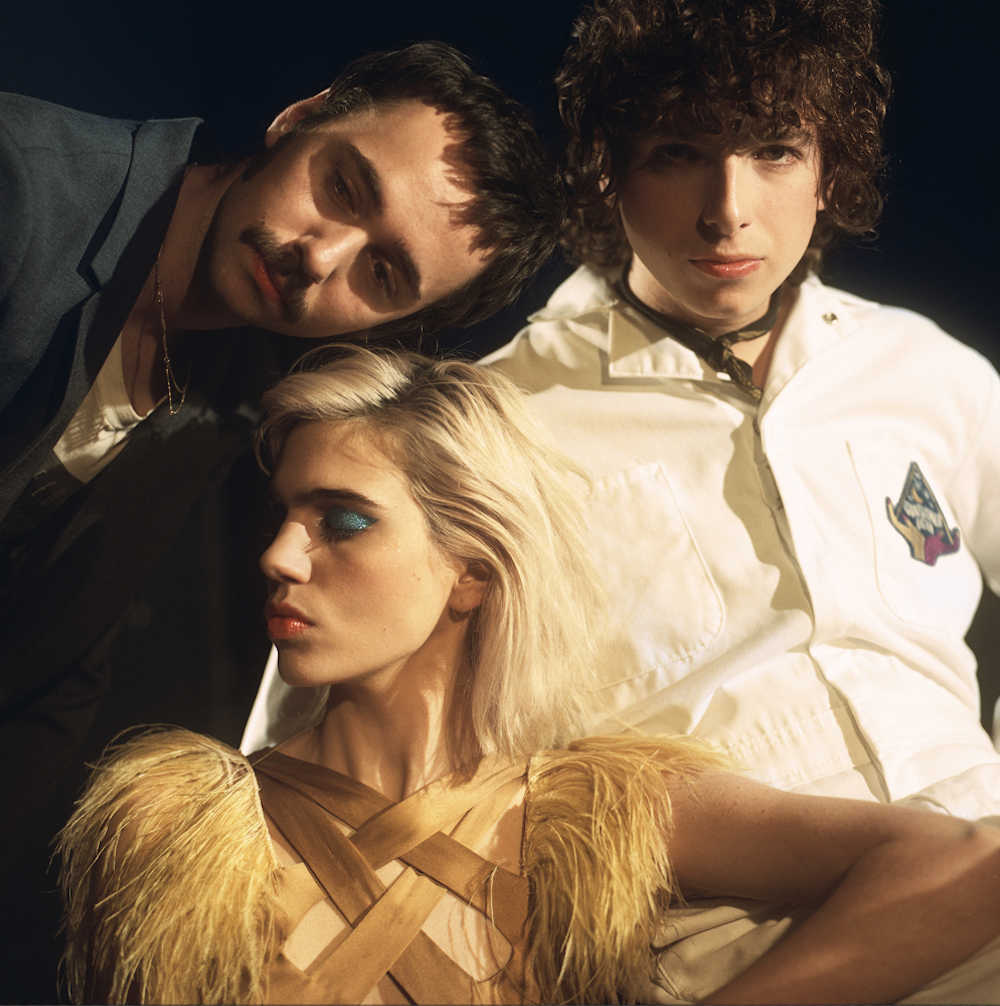
WEISS: Sonically though, how do you think Twentytwo in Blue lines up with your previous releases? In my mind, it’s definitely a departure from the more lo-fi garage and shoegaze sound of tracks like 2016’s “Easier Said.”
KIVLEN: When we finally finished touring at the end of 2016, we were quite honestly, kind of sick of our sound. It was a lot of chorus-heavy guitars and ‘80s-inspired tones that we just wanted to throw out and start over with something different and new. So, we bought all new gear and new guitars, and just wanted to see where it would take us. As far as songwriting, we wanted to rely less on tricks and little signature things we’d done in the past, and just focus on writing good, meaningful music.
WEISS: So, how do you describe your new sound?
KIVLEN: It’s kind of hard to put one tag or label on our music. I know a lot of people like to make up crazy run-on genres, but it’s hard to do that with us because we have so many different influences.
CUMMING: We’re also three separate songwriters all bringing in our own experiences and influences. So, it’s just not something I think can be boxed in. I mean, I definitely think the record is more classic sounding, but I don’t even want to say “classic rock,” because I think that term can get corny real fast. It’s just more—
KIVLEN: Timeless?
CUMMING: No, timeless is too much. We’re not Frank Sinatra here. But I think it’s just more classic.
WEISS: Being three individual songwriters, how does your process work?
CUMMING: It’s based on trust. We’re almost like this little collective that trusts each other enough to know that we’re only going to make whatever one of us started, better—if that makes sense.
WEISS: When you first started, Sunflower Bean got a lot of buzz, partly due to who you are, Julia, as a model, but also because fashion seems to play a big role in how you identify as a band. Has that affected how you choose to present yourselves? Like, do you try to stay away from certain things because of your fashion background?
CUMMING: Whenever you get any kind of success—not just from music or modeling, but from anything—there’s an initial reaction that makes you want to reject it because you don’t want to feel defined by it, you know? Especially with musicians — and female musicians, or artists in general—you never want to feel like you’re being put in any kind of box. But one thing I dislike is when people do something then don’t stand behind it. So, for me, when it comes to my career in fashion, I’ve always been very straightforward about the fact that I love fashion. I don’t feel like myself if I’m not using my style as a part of my art. Of course, fashion gets complicated because it’s commerce, and the monetization of style. But I stand behind everything that I do and that I’ve done. Also, when it comes to my music, I’ve given everything that I have as a person to create it. So, there’s nothing anyone could say—like, “Oh she’s not good at bass,” or “Oh she’s famous because she’s a model” or whatever. In my head, I know that’s not true because I give it my all every time I get onstage.
WEISS: So, your style is just another facet of the band.
KIVLEN: Yeah, and honestly, when we started playing shows, we looked at the way we dressed as a kind of a rebellion against what we were seeing everywhere. Bands in Brooklyn were getting onstage wearing jeans and t-shirts. So, we wanted to take a whole different route.
CUMMING: That’s sort of what we always do. Rebellion is at the heart of Sunflower Bean. We like to look at whatever other people are doing—or even what would be easy for us personally—and do the opposite. We’re always trying to figure out how to push ourselves to dig deeper, take it further and create something new.
WEISS: Do you take the same approach when getting dressed for stage?
CUMMING: When it comes to my style, something I’ve always thought of as my own kind of rebellion is this idea of like, “Why can’t I be feminine? Why can’t I honor these parts of myself? Why can’t I dress the way that I want to and still be taken seriously?” I don’t have to wear jeans to be a good bass player, and I’m not a bad one if I like to dress up. So, for me to dress how I want, to present how I want, to be skimpy, to be covered, to be anything, and also be the best bass player and singer I can be—that, to me, is the height of my feminism because that’s me not just being a woman, but a person. It’s me being free and embracing all sides of myself.
WEISS: Right, and it’s a unique thing for female and femme-presenting artists to have to consider what they’re wearing and if that will somehow delegitimize them.
CUMMING: Totally. I mean, we still get questions in interviews like, “Do you feel like being a model or dressing the way you do takes away from your work?” My only response is just, “Right now, no,” because the only thing that could happen is someone underestimates me, then sees us play and thinks, “Oh, I didn’t realize they were that good” or “Oh I thought she was just some fancy fashion model.” Of course, it doesn’t feel great to be underestimated because I like wearing dresses or whatever, but—
FABER: That’s not our problem. We don’t care.
CUMMING: Exactly, and I’m also optimistic about the way things are going. It’s finally getting less and less rare for women to be in bands and onstage. That only makes me excited because the more women can just be people, instead of being sensationalized, and can just be themselves, instead of being pushed into stereotypes—that’s progress.
KIVlEN: It’s gotten better even since we started. We definitely get a lot less questions like, “What’s it like to be in a band with a girl?”
CUMMING: Or stories about what makeup I wear on tour.
WEISS: Do you think that’s because the industry is changing? Or is it because this is your second album, and you’ve somehow already “proven yourself”?
CUMMING: Probably a combination of both. But it’s hard for me to answer that objectively because I always have to take into consideration my privilege. The music industry is definitely still twisted and can be super dark. It has a long way to do. But a feature about what makeup I wear isn’t always bad because that’s also part of my life, and part of who I am. It’s just not all of it. So, the best would be if I could talk about makeup and my bass in the same breath. That would be cool.
WEISS: How do you think you’ve grown as artists?
CUMMING: In so many ways. I mean, when we first started, Jacob was fairly new to drums and I played what I liked to call “songwriter’s bass,” which meant I could only play my own work. I was afraid to even play with Nick and Jacob because I thought they wouldn’t take me seriously. Now, those things don’t even cross our minds. We’re just going for it all of the time.
FABER: After every show, every tour, we always feel like we’re improving. So, it’s more of a constant growth. That, in conjunction with our own maturing has brought us to where we are now as a band, which is a cool place to be. And we’re not slowing down any time soon.
SUNFLOWER BEAN’S LATEST RECORD TWENTYTWO IN BLUE IS OUT NOW.


